“Girls, take my advice, marry an animal. A wooly one is most consoling. Find a fur man, born midwinter. Reared in the mountains. Fond of boxing. Make sure he has black rubbery lips, and a sticky sweet mouth. A winter sleeper. Pick one who likes to tussle, who clowns around the kitchen, juggles hot baked potatoes, gnaws playfully on a corner of your apron. Not one mocked by his lumbering instincts, or who’s forever wrestling with himself, tainted with shame, itchy with chagrin, but a good-tempered beast who plunges in greedily, grinning and roaring. His backslapping manner makes him popular with the neighbors, till he digs up and eats their Dutch tulip bulbs. Then you see just how stuffy human beings can be. On Sundays his buddies come over to play watermelon football. When they finally get tired, they collapse on heap of dried grass and leaves, scratching themselves elaborately, while I hand out big hunks of honeycomb. They’ve no problem swallowing dead bees stuck in the honey.”
— Amy Gerstler, “Bear-Boy of Lithuania,” included in Medicine
Archives for March 2008
TT: So you want to see a show?
Here’s my list of recommended Broadway, off-Broadway, and out-of-town shows, updated weekly. In all cases, I gave these shows favorable reviews in The Wall Street Journal when they opened. For more information, click on the title.
Warning: Broadway shows marked with an asterisk were sold out, or nearly so, last week.
BROADWAY:
• August: Osage County (drama, R, adult subject matter, closes Apr. 20 and reopens Apr. 29 at the Music Box Theatre for an open-ended run, reviewed here)
• Avenue Q (musical, R, adult subject matter and one show-stopping scene of puppet-on-puppet sex, reviewed here)
• A Chorus Line (musical, PG-13/R, adult subject matter, reviewed here)
• Grease * (musical, PG-13, some sexual content, reviewed here)
• The Homecoming (drama, R, adult subject matter, closes Apr. 13, reviewed here)
• The Little Mermaid (musical, G, entirely suitable for children, reviewed here)
• November (comedy, PG-13, profusely spattered with obscene language, reviewed here)
• Passing Strange (musical, PG-13, adult subject matter, reviewed here)
• The Seafarer (drama, PG-13, adult subject matter, closes Mar. 30, reviewed here)
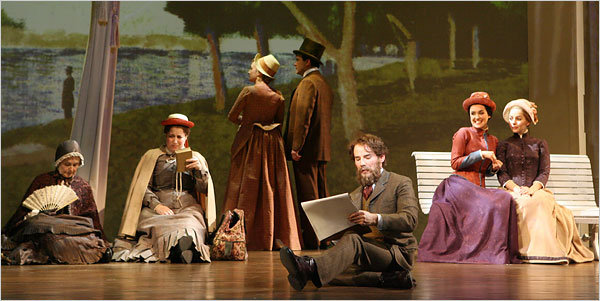 • Sunday in the Park with George * (musical, PG-13, closes June 16, reviewed here)
• Sunday in the Park with George * (musical, PG-13, closes June 16, reviewed here)
OFF BROADWAY:
• Adding Machine (musical, PG-13, too musically demanding for youngsters, reviewed here)
ON TOUR:
• Moby-Dick–Rehearsed (drama, G, not suitable for children, touring the U.S. through May 17, reviewed here)
CLOSING SOON ON BROADWAY:
• Alfred Hitchcock’s The 39 Steps * (comedy, G, suitable for bright children, closes Mar. 29 and reopens Apr. 29 at the Cort Theatre for an open-ended run, reviewed here)
CLOSING NEXT WEEK IN LOS ANGELES:
• Victory (drama, PG-13, adult subject matter, closes Mar. 23, reviewed here)
CLOSING SUNDAY ON BROADWAY:
• Come Back, Little Sheba (drama, PG-13, adult subject matter, reviewed here)
TT: Almanac
“Hypocrisy is the most difficult and nerve-racking vice that any man can pursue; it needs an unceasing vigilance and a rare detachment of spirit. It cannot, like adultery or gluttony, be practised at spare moments; it is a whole-time job.”
W. Somerset Maugham, Cakes and Ale
* * *
“A hypocrite despises those whom he deceives, but has no respect for himself. He would make a dupe of himself too, if he could.”
William Hazlitt, Characteristics: In the Manner of Rochefoucault’s Maxims
CAAF: Wishers were ever fools
While the Ted Hughes moment is afoot, now is maybe a good time to publicly wish that his book Shakespeare and the Goddess of Complete Being be brought back into print. It’s such an eccentric and dazzling piece of criticism, it seems terrible that it’s fallen out of print in both the United States and England.* Especially since Hughes claimed writing it gave him cancer — the least we could do is keep the book circulating a while longer.
Faber & Faber? NYRB? Anyone?
* Currently, the cheapest copy on Abebooks is $88; a used copy on Amazon.uk is 80 pounds. Every time I check out the local library’s copy, I worry that I’m going to misplace it somewhere and have to wash dishes in the library kitchen forever.
RELATED: A nice piece about Hughes and myth from the Journal of Mythic Arts.
CAAF: Loose notes
“Usually his wit was austerely pure, but sometimes he could jolt the more cynical. Once we were looking at a furnished apartment that one of our friends had just rented. It was overbearingly eccentric. Life-size clay lamps like flowerpots remodeled into Matisse nudes by a spastic child. Paintings made from a palette of mud by a blind painter. About the paintings Randall said, ‘Ectoplasm sprinkled with zinc.’ About the apartment, ‘All that’s missing are Mrs. X’s illegitimate children in bottles of formaldehyde.'”
Robert Lowell, “Randall Jarrell, 1914-1965: An Appreciation”
TT: Almanac
“The sense of doing good, the satisfaction of being right, the joy of looking favorably upon oneself, dear sir, are powerful levers for keeping us upright and making us progress. On the other hand, if men are deprived of that feeling, they are changed into rabid dogs.”
Albert Camus, The Fall
TT: Almanac
“A negative judgment gives you more satisfaction than praise, provided it smacks of jealousy.”
Jean Baudrillard, Cool Memories
TT: Men (and women) at work (VI)
Last week Paul Moravec and I spent four days preparing a workshop performance of the first six scenes of The Letter, our Somerset Maugham opera-in-progress, at a midtown rehearsal studio. On Wednesday morning we recorded all six scenes at the New York headquarters of the Santa Fe Opera, after which we performed them for a small invited audience of opera and theater professionals. Then, on Thursday evening, we gave a second performance, this time at an Upper East Side cocktail party thrown on behalf of Santa Fe Opera by two longtime friends of the company who live in the biggest townhouse I’ve ever seen. (It looks like the set of Holiday, only in color.) We presented twenty minutes’ worth of excerpts from The Letter to an audience of a hundred-odd well-heeled opera buffs, augmented by a sprinkling of singers and other music-business types.
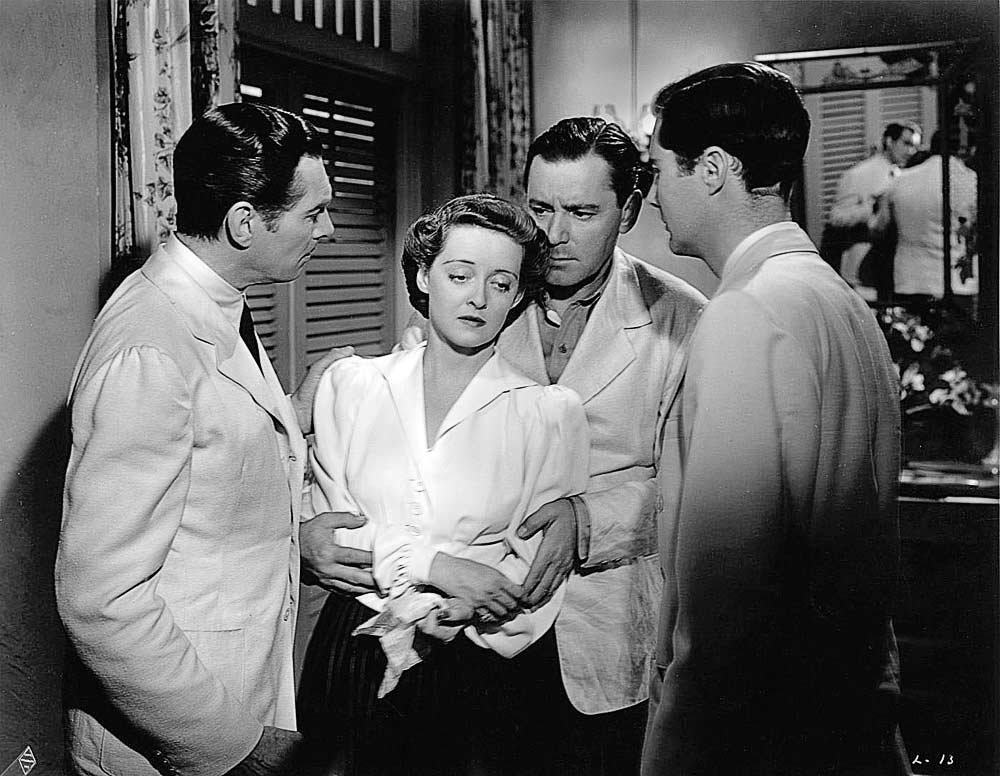 When I say “we,” of course, I don’t mean “Paul and I.” Santa Fe engaged eleven professional singers, flew in one of of its staff accompanists, and turned the lot of them over to us for the week. They did the performing. All we did was rehearse them, then introduce the opera on Wednesday afternoon and Thursday night. One of the singers with whom we worked, James Maddalena, is well known in the opera world (he created the title role in John Adams’ Nixon in China). The others were up-and-comers whose names will likely be unfamiliar to you–though I doubt they’ll stay that way. All of them, Jim very much included, worked incredibly hard at learning The Letter, then sang it with the utmost sympathy and comprehension. I don’t care for laundry lists, but sometimes they’re unavoidable, and Paul and I are grateful beyond words to Jim, Jennifer Aylmer, Jon-Michael Ball, Jeffrey Behrens, Benjamin Bloomfield, David Giuliano, Stephen Hartley, Alex Mansoori, Kelly Markgraff, Alex Richardson, and Rosalie Sullivan–as well as to Kirt Pavitt, our pianist, who had only a few days to prepare Paul’s complicated score, yet somehow managed to pull it off. No matter who performs The Letter in the future, Paul and I will never forget the twelve talented men and women who first showed us what we had wrought.
When I say “we,” of course, I don’t mean “Paul and I.” Santa Fe engaged eleven professional singers, flew in one of of its staff accompanists, and turned the lot of them over to us for the week. They did the performing. All we did was rehearse them, then introduce the opera on Wednesday afternoon and Thursday night. One of the singers with whom we worked, James Maddalena, is well known in the opera world (he created the title role in John Adams’ Nixon in China). The others were up-and-comers whose names will likely be unfamiliar to you–though I doubt they’ll stay that way. All of them, Jim very much included, worked incredibly hard at learning The Letter, then sang it with the utmost sympathy and comprehension. I don’t care for laundry lists, but sometimes they’re unavoidable, and Paul and I are grateful beyond words to Jim, Jennifer Aylmer, Jon-Michael Ball, Jeffrey Behrens, Benjamin Bloomfield, David Giuliano, Stephen Hartley, Alex Mansoori, Kelly Markgraff, Alex Richardson, and Rosalie Sullivan–as well as to Kirt Pavitt, our pianist, who had only a few days to prepare Paul’s complicated score, yet somehow managed to pull it off. No matter who performs The Letter in the future, Paul and I will never forget the twelve talented men and women who first showed us what we had wrought.
Workshopping The Letter gave us a chance to hear what the score sounds like when performed by real singers–and to talk to those singers about how it feels to perform the opera. Theater is an empirical art form: it’s about what works. If an opera doesn’t work for the people who perform it, it won’t work for the people who watch it. Hence our interest was mainly in practical matters. What parts of the score are particularly difficult to learn? Are the vocal lines well written for the voice? Do the words sit comfortably on the tongue? These were some of the questions we brought with us into the studio, and by the time everybody went home on Thursday night, Paul and I had learned many important things about the score as it stands now. He made a considerable number of small but significant changes on the spot–lowering high notes, raising low notes, inserting rests to add dramatic punctuation at key moments–and I did the same to the libretto.
Here’s an example of what we did. In Scene Two, Leslie Crosbie, the star of The Letter, asks Robert, her cuckolded husband, “Is he…is he still there?” The “he” in question is the corpse of Geoff Hammond, whom the pistol-packing Leslie has just filled with lead. “No, I had the body taken away,” Robert responds in the draft of the scene that Paul set. But as soon as he heard Kelly Markgraff sing that line to Jen Aylmer at the first rehearsal, he told me, “It’s not coming through clearly. Can you think of a crisper-sounding line?”
“Something with a p or t in the middle?”
“Yeah, something like that. Something that pops. But I don’t want to change the rhythm of the vocal line. I like it the way it is. Can you make the new words fit what I’ve written?”
I considered the problem for a moment, running over the scansion of the line in my head: DUM da-da-da DUM-da da-da-da-DUM. Then I scribbled an alternate version into my score: “No, I told the men to take him away.”
“Does that work?” I asked Paul.
“I think so,” he said. “Kelly, would you try singing this line instead?”
Kelly sang it, Paul wrote the line into his score, and that was that.
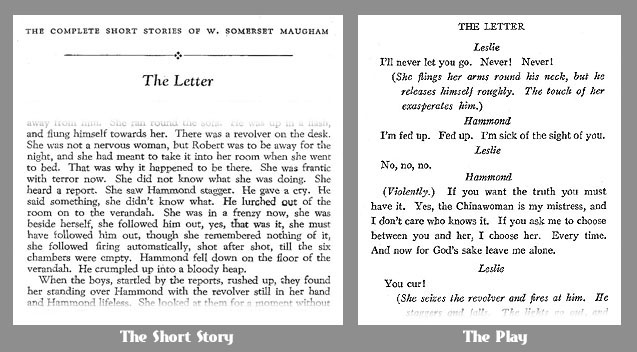 This exchange says a lot about what a librettist does. His job is, above all, to make the composer more effective. “There is a great satisfaction in building good tools for other people to use,” Freeman Dyson wrote in Disturbing the Universe. That’s how I feel about my libretto for The Letter: I see it not as an independent art object but as a tool, an opera-shaped vessel into which Paul is pouring his music. And it’s his music, not mine, which means that at the end of the day, Paul is by definition the senior partner in our collaboration. Neither one of us is shy about making suggestions–we’ve talked over every page of the score, often in excruciatingly niggling detail–but he has to feel comfortable with my words in order to do his best work, and so on the rare occasions when we have a disagreement about some aspect of the libretto that can’t be resolved through discussion, I always do what he wants.
This exchange says a lot about what a librettist does. His job is, above all, to make the composer more effective. “There is a great satisfaction in building good tools for other people to use,” Freeman Dyson wrote in Disturbing the Universe. That’s how I feel about my libretto for The Letter: I see it not as an independent art object but as a tool, an opera-shaped vessel into which Paul is pouring his music. And it’s his music, not mine, which means that at the end of the day, Paul is by definition the senior partner in our collaboration. Neither one of us is shy about making suggestions–we’ve talked over every page of the score, often in excruciatingly niggling detail–but he has to feel comfortable with my words in order to do his best work, and so on the rare occasions when we have a disagreement about some aspect of the libretto that can’t be resolved through discussion, I always do what he wants.
What has been most striking about the process of writing The Letter, at least to me, is how infrequently the two of us disagree about anything at all. This is partly because we discussed the opera time and again for several months before I started writing the libretto, but even more because we are, aesthetically speaking, on the same page. We’re so closely in sync, in fact, that we ran last week’s rehearsals jointly. It wasn’t something we planned in advance–it simply happened that way.
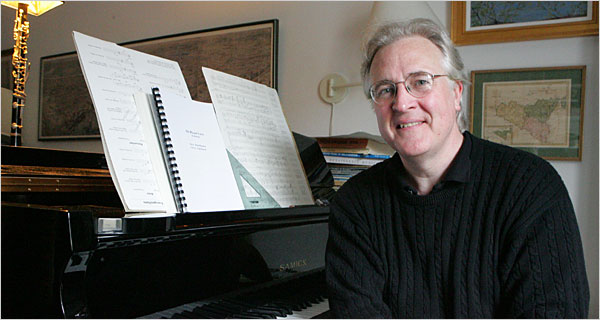 Our personalities, however, are quite different, and to some extent the public aspect of our collaboration reflects that difference. Paul is a serious, soft-spoken person who sounds like an artist when he talks. I, on the other hand, come across more like a newspaperman (or a jazz musician) than an aesthete, and I suspect that some of the people I’ve been meeting in the opera world have found me to be rough around the edges. Paul, by contrast, is so gentlemanly that his zany streak isn’t immediately apparent to those meeting him for the first time. I’m sure that some of the singers who performed The Letter for us last week found it intimidating to work with a Pulitzer Prize-winning composer–that is, until Paul strolled into the studio, sat down at the piano, and started singing “Sexy Sadie” in his very best John Lennon accent. Everybody loosened up pretty quickly after that.
Our personalities, however, are quite different, and to some extent the public aspect of our collaboration reflects that difference. Paul is a serious, soft-spoken person who sounds like an artist when he talks. I, on the other hand, come across more like a newspaperman (or a jazz musician) than an aesthete, and I suspect that some of the people I’ve been meeting in the opera world have found me to be rough around the edges. Paul, by contrast, is so gentlemanly that his zany streak isn’t immediately apparent to those meeting him for the first time. I’m sure that some of the singers who performed The Letter for us last week found it intimidating to work with a Pulitzer Prize-winning composer–that is, until Paul strolled into the studio, sat down at the piano, and started singing “Sexy Sadie” in his very best John Lennon accent. Everybody loosened up pretty quickly after that.
Even though we appear to be ill sorted, Paul and I are birds of a feather when it comes to artistic matters, which may help to explain why we’re not planning to make any drastic changes to the first six scenes of The Letter now that we’ve heard them performed. As the saying goes, operas aren’t written, they’re rewritten, yet this one has turned out so far not to need all that much rewriting. Details, yes–we’re sweating those–but it’s starting to look as though we’d already gotten most of the big things right by the time we brought The Letter into the studio. Paul and I wanted to write an “audience piece,” a tradition-based opera that would excite mainstream audiences, and judging by the enthusiastic response of the two groups who heard it last week, we seem to be well on our way to doing so. Hard-nosed professionals were present at both of those performances, too, and their comments were equally enthusiastic and encouraging. A playwright–no names, but you’d probably recognize his–came to the first run-through, and when it was over, Paul asked if he had any “notes,” which is backstage talk for “suggestions.” To my astonishment, he replied, “My only note is more. Don’t change anything. You have a winner here.” (In case you’re wondering, I’ve never reviewed any of his plays in The Wall Street Journal.)
Two especially interesting people came to the Thursday-night performance. One, believe it or not, is a member of the Singapore Club, in which Scene Five of The Letter is set. The scene opens with a drinking song performed by the clubmen, and I was amused by a comment made to me later in the evening by the real-life clubman: “What time does this scene take place? You have the characters drinking whisky, but in Singapore we don’t start drinking whisky until sunset. Before then, it’s gin.”
I laughed. “Not to worry,” I said. “The time is late afternoon. And you’re not going to believe this, but the very next line that comes after the chorus we did tonight is Ah, counselor! Would you like to fire the sunset gun?”
“I think that will pass muster,” he replied.
As if that weren’t unlikely enough, the next person I met was Melanie Wyler, the daughter of William Wyler, who directed the 1940 film version of The Letter. I nearly fell down.
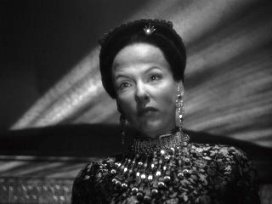 “I’m honored to meet you, ma’am,” I told her, resisting the impulse to ask for her autograph. “Were you surprised when the Chinese woman started singing?” (In Maugham’s 1927 play and Howard Koch’s 1940 screenplay, the Chinese mistress of Leslie’s lover does not speak English and never says a word.)
“I’m honored to meet you, ma’am,” I told her, resisting the impulse to ask for her autograph. “Were you surprised when the Chinese woman started singing?” (In Maugham’s 1927 play and Howard Koch’s 1940 screenplay, the Chinese mistress of Leslie’s lover does not speak English and never says a word.)
“I was glad to hear from her!” she replied. “And I loved your opera. I can’t wait to see it in Santa Fe.”
“Me, neither,” I said.
So…what next? Plenty. I’ve still got a book to finish, not to mention my regular reviewing duties at The Wall Street Journal. I’ll be going to a press preview of Caryl Churchill’s new play on Thursday, then flying to Boston to see Alvin Epstein in The Tempest on Sunday. Never a dull moment around this shop, in other words. But I did make a point of giving myself some time off over the weekend. I went to see Be Kind Rewind with a friend on Saturday night, and I spent Sunday curled up on the couch reading Patrick O’Brian, listening to Aaron Copland and Donald Fagen, and talking to Mrs. T on the phone (she drove back to Connecticut on Friday after attending the Thursday-night performance).
 Mostly, though, I spent the day marveling at the improbable fact that at the age of fifty-two, I’ve somehow metamorphosed into a librettist whose first project is in the process of being produced by one of the best-known opera companies in the world. Paul Hindemith and Igor Stravinsky conducted at Santa Fe. Kiri Te Kanawa and Bryn Terfel made their American debuts there. Thomas Adés, Peter Lieberson, Tobias Picker, and Bright Sheng were all commissioned to write operas that were performed there. And now…me.
Mostly, though, I spent the day marveling at the improbable fact that at the age of fifty-two, I’ve somehow metamorphosed into a librettist whose first project is in the process of being produced by one of the best-known opera companies in the world. Paul Hindemith and Igor Stravinsky conducted at Santa Fe. Kiri Te Kanawa and Bryn Terfel made their American debuts there. Thomas Adés, Peter Lieberson, Tobias Picker, and Bright Sheng were all commissioned to write operas that were performed there. And now…me.
Paul, unlike me, is used to this sort of thing. One of his pieces, Songs of Love and War, was performed at Carnegie Hall the night before the first run-through of The Letter. But I have a sneaking feeling that when I stand in the wings of the Crosby Theater next August, getting ready to take my bow and checking to make sure that my fly is zipped, I’ll still feel more like an actor who’s playing the part of a librettist, waiting for the director to say, “All right, everybody, that’s it for today. See you first thing tomorrow morning. Oh, yes, Terry–would you please brush up on your lines?”
